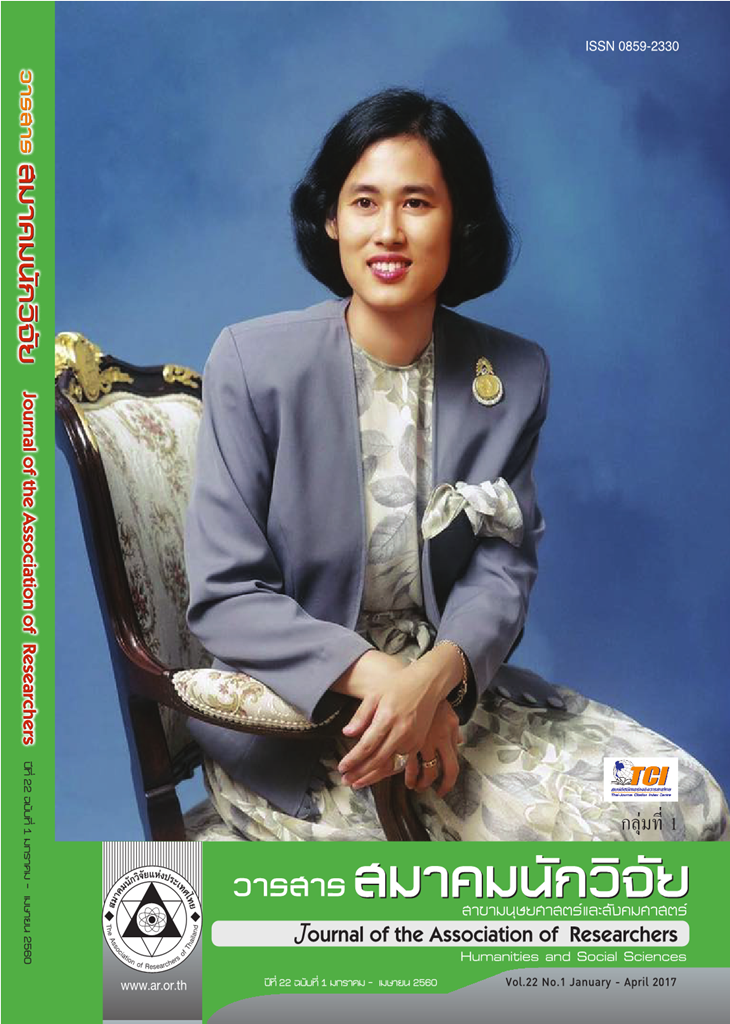Factor Analysis of Social Marketing Factors towards the Environmental Friendly Products Buying Behavior of Consumers in Thailand
Main Article Content
Abstract
The research was aim to study confirmatory factor analysis of social marketing towards in environmentally friendly products buying behavior of consumers in Thailand. To serve as a guide in planning social marketing optimization and enterprise business context of the stimulus to encourage consumer purchase behavior in environmentally friendly products. Questionnaires were used to collect information from consumer’s nationwide 724 people. The result found that Elements of the means of social marketing. Can be divided into six elements include social marketing, environmental policies. Social marketing mix consists of Product Pricing Distribution Communications and the reference group In addition, the test found. Model to measure is consistent with empirical data the Chi-Square = 242.475, df = 138, p = 0.61, RMSEA = 0.032, GFI = 0.978, AGFI = 0.927, according to all the criteria. The suggestion was that the environmental social marketing policy, the social marketing mix and the reference group were the arousing factors of the environmental friendly products buying behaviour of the consumers in Thailand. Besides, the business organizations could also apply to plan the social marketing strategies especially for the environment friendly products or the concerning industry. The purposes were to suggest the innovative products to the consumers as well as to differentiate the business from other competitors. In addition, it could sustainably make the marketing promotion for the environment friendly products in Thailand.
Article Details
บทความที่ปรากฏในวารสารนี้ เป็นความรับผิดชอบของผู้เขียน ซึ่งสมาคมนักวิจัยไม่จำเป็นต้องเห็นด้วยเสมอไป การนำเสนอผลงานวิจัยและบทความในวารสารนี้ไปเผยแพร่สามารถกระทำได้ โดยระบุแหล่งอ้างอิงจาก "วารสารสมาคมนักวิจัย"
References
จินตวีร์ เกษมศุข. (2554). การสื่อสารกับการเปลี่ยนแปลงของสังคม. กรุงเทพฯ: สำนักพิมพ์จุฬาลงกรณ์ มหาวิทยาลัย.
ปวีณ์กร แก้วบุตร. (2556). พฤติกรรมการเลือกซื้อผลิตภัณฑ์ที่เป็นมิตรต่อสิ่งแวดล้อมของนักศึกษาปริญญาตรี คณะ เศรษฐศาสตร์ มหาวิทยาลัยเชียงใหม่. ปริญญาโท คณะเศรษฐศาสตร์ มหาวิทยาลัยเชียงใหม่. จังหวัดเชียงใหม่.
ธัญปวีณ์ รัตน์พงศ์พร. (2553). แบบจำลองพฤติกรรมการซื้อผลิตภัณฑ์ที่เป็นมิตรต่อสิ่งแวดล้อมของผู้บริโภค. ดุษฎีนิพนธ์ ปรัญญาดุษฎีบัณฑิต (สาขาบริหารธุรกิจ) กรุงเทพฯ: บัณฑิตวิทยาลัย มหาวิทยาลัยรามคำแหง.
สมพล วันต๊ะเมล์. (2550). “การตลาดเพื่อสังคม : กลยุทธ์สำคัญเพื่อการพัฒนาประชากร” ใน วารสารประชากรศาสตร์. 49-66.
สาวิตรี อุดพล. (2552). “ การศึกษาของความสำนึกห่วงใยต่อสิ่งแวดล้อม และระดับความรู้เกี่ยวกับ ผลิตภัณฑ์สีเขียวที่มี ต่อความตั้งใจซื้อผลิตภัณฑ์สีเขียว” การค้นคว้าอิสระ สาขาบริหารธุรกิจ มหาวิทยาลัยนเรศวร.
เสรี วงษ์มณฑา. (2542). ครบเครื่องเรื่องการสื่อสารการตลาด. พิมพ์ครั้ง ที่ 1. กรุงเทพฯ: วิสิทธิ-พัฒนา.
สุระพันธ์ สวัสดิพรรค. (2545). ทัศนคติของผู้บริโภคที่มีต่อองค์กรธุรกิจที่ใช้นโยบายการตลาดเพื่อสังคม. วิทยานิพนธ์ บริหารธุรกิจมหาบัณฑิต. มหาวิทยาลัยบูรพา.
อรจิรา ชัยบัณฑิตย์. (2553). แนวคิดความรับผิดชอบต่อสังคม (CSR) กับการจัดการสิ่งแวดล้อม. กรุงเทพมหานคร: กลุ่มเศรษฐศาสตร์สิ่งแวดล้อม กองแผนงานและประเมินผล.
References
Benjamin, M.O., K.H. William and C.B. Anne. (2007). “Purchasing organic food in US food systems; A study of attitudes and practice.” British Food Journal Bradford 109 (5): 399-411.
Burn, R. (1990). Introduction to Research Method. Melbourne: Longman Chesire.
Department of Environmental Quality Promotion (2015). "The importance of COP21 and the role of Thailand in meeting and acting as a member country." (Online). http://www.deqp.go.th/knowledge/ cop21/, 25 ตุลาคม 2558. (in Thai).
Freemen, J.B. (1988). Thinking Logically Basic Concepts for Reasoning. Englewood Cliffs, New Jersey: Prentice Hall.
Gordon, R. (2011) “Critical social marketing: Definition, application and domain”, Journal of Social marketing, 1(2), 82-99. Hair, J., W.C. Blak, B.J. Barbin, R.E. Anderson and R.L.
Tatham. (2006). Multivariate Data Analysis. 6thed. Upper Saddle River, NJ: Prentice-Hall. Hamzaoui, E.L. and Z. Mehdi. (2008). “Decision making process of community organic food consumers an exploratory study.” Journal of Consumer Marketing 25: 95-104.
Hawkins, J.D. (2001). Consumer behavior: Building marketing strategy. Boston: Irwin/McGraw Hill. Jintavee Kasem Suk. (2554). Communication with the transformation of society. Bangkok: Chulalongkorn University Press. (in Thai).
Kotler, P. and G. Zaltman. (1971). “Social marketing: an approach to planned social change.” Journal of Marketing 35: 3-12.
Kotler, P., Roberto, N. & Lee, N. (2002). Social marketing: improving the quality of life. Thousand Oaks, Calif :Sage Publications. Kotler and A. Andreasen (1991). “Strategic Marketing for NonProfit Organizations,” Prentice Hall, New York.
Kotler, Phillip; & Keller, Kevin Lane. (2006). Marketing Management. New Jersey: Pearson/Prentice-Hall. May, T. (1997). Social Research: Issue, Methods and Process. 2nd ed. Buckingham: Open University Press. Nancy R. Lee and Philip
Kotler (SAGE 2011) Social Marketing: Influencing Behaviors for Good, Fourth Edition. Orjira Chaibundith(2010). Social Responsibility (CSR) Concepts and Environmental Management. Bangkok: Environmental Economics Group Planning and Evaluation Division. (in Thai).
Preeyakorn Kaewbutr. (2013). The Behavior of Purchasing Eco-Friendly Products of Undergraduate Students, Faculty of Economics, Chieng Mai University. Master of Economics Chiang Mai University. Chiangmai Province. (in Thai).
Rokka, J., & Uusitalo, L. (2008). Preference for green packaging in consumer product choices – Do consumers care? International Journal of Consumer Studies, 32(5), 516–525.
Rowley, J., & Marco. (2006). Spiezia Organic : an SME Marketing Case Study. The Marketing Review, 6, 253-236.
Sawitree Udontri (2009). "The study of environmental consciousness. And the level of knowledge about green products towards the intention to buy green products." Business Administration Naresuan University. (in Thai).
Seree Wongmonta (1999). Communication in Marketing. 1st edition. Bangkok: Wiisit-Pattana. (in Thai). Sompol Wantamae "Social Marketing: Key Strategies for Population Development" in the Journal of Demography. 49-66. (in Thai).
Stanton, William J.; & Charles Futrell. (1987). Fundamentals of Marketing. 8th ed. New York:
Sukapan Sawasdi (2002). Consumer attitudes towards business organizations using social marketing. Master of Business Administration Burapa university. (in Thai).
Thanyaporn Rattapongporn (2010). Consumer Behavior Consumer Buying Behavior Model Doctoral degree in Ph.D. (Business Administration) Bangkok: Graduate School Ramkhamhaeng University. (in Thai).
Walker, M., & Kent, A. (2009b). CSR on tour: Attitudes towards corporate social responsibility among golf fans. International Journal of Sport Management, 11(1), 1-28.
Wiersma, W. (1991). Research Method in Education, (5th edition). Sydney: Allyn and Bacon.


